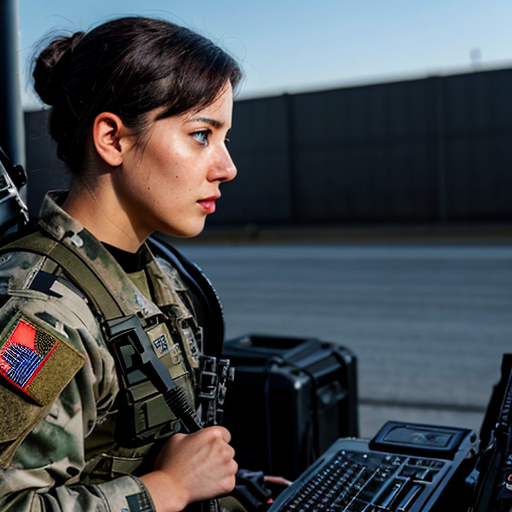Certified C7ISR Engineer (CC7ISR-Eng)

Length: 2 Days
The Certified C7ISR Engineer (CC7ISR-Eng) Certification Course by Tonex provides comprehensive training in Command, Control, Communications, Computers, Cyber, Intelligence, Surveillance, and Reconnaissance (C7ISR) systems engineering. This course equips participants with the knowledge and skills necessary to design, develop, integrate, and maintain complex C7ISR systems used in defense, intelligence, and homeland security applications. Through a blend of theoretical lectures, hands-on exercises, and real-world case studies, participants gain a deep understanding of C7ISR principles, architectures, technologies, and best practices.
Learning Objectives:
- Understand the fundamental concepts and principles of Command, Control, Communications, Computers, Cyber, Intelligence, Surveillance, and Reconnaissance (C7ISR) systems.
- Explore the various components, subsystems, and architectures of C7ISR systems.
- Learn the process of requirements analysis, system design, integration, testing, and deployment of C7ISR systems.
- Gain proficiency in selecting and integrating C7ISR technologies, including sensors, communication networks, data processing systems, and cybersecurity solutions.
- Develop skills in assessing and mitigating risks associated with C7ISR systems, including cyber threats and vulnerabilities.
- Acquire knowledge of relevant standards, regulations, and best practices governing C7ISR engineering.
- Apply systems engineering methodologies and tools to optimize the performance, reliability, and interoperability of C7ISR systems.
- Enhance problem-solving and decision-making skills in the context of C7ISR system development and operations.
- Collaborate effectively with multidisciplinary teams involved in C7ISR projects, including engineers, analysts, operators, and stakeholders.
- Prepare for the Certified C7ISR Engineer (CC7ISR-Eng) certification exam through comprehensive review sessions and practice assessments.
Audience: The Certified C7ISR Engineer (CC7ISR-Eng) Certification Course is designed for professionals involved in the design, development, integration, and maintenance of Command, Control, Communications, Computers, Cyber, Intelligence, Surveillance, and Reconnaissance (C7ISR) systems. This includes:
- Systems Engineers
- C7ISR Engineers
- Defense Contractors
- Military Personnel
- Government Officials
- Cybersecurity Professionals
- Intelligence Analysts
- IT Specialists
- Telecommunications Engineers
- Electronics Engineers
- Project Managers
- Anyone seeking to enhance their knowledge and skills in C7ISR engineering.
Course Outlines:
Module 1: Fundamentals of C7ISR Systems Engineering
- Introduction to C7ISR Systems
- Systems Engineering Principles
- C7ISR Architecture Overview
- Requirements Analysis
- System Design Methodologies
- Integration and Testing Strategies
Module 2: C7ISR Technologies and Subsystems
- Sensors and Sensor Integration
- Communication Systems and Networks
- Data Processing and Fusion
- Cybersecurity in C7ISR Systems
- Intelligence Collection and Analysis
- Reconnaissance and Surveillance Platforms
Module 3: C7ISR System Design and Development
- System Requirements Specification
- Conceptual Design
- Detailed Design
- Prototyping and Modeling
- Design Verification and Validation
- System Documentation and Configuration Management
Module 4: C7ISR System Integration and Testing
- Integration Planning and Management
- Interface Control and Management
- Hardware and Software Integration
- System Testing Techniques
- Test Automation Tools
- Verification and Validation Processes
Module 5: C7ISR System Operations and Maintenance
- System Deployment and Installation
- Operation and Performance Monitoring
- Maintenance Planning and Execution
- Fault Detection and Diagnosis
- Software and Hardware Upgrades
- Lifecycle Management
Module 6: C7ISR System Optimization and Security
- Performance Optimization Techniques
- Interoperability and Compatibility Considerations
- Risk Assessment and Management
- Cybersecurity Measures and Countermeasures
- System Resilience and Redundancy
- Compliance with Standards and Regulations
Exam Domains:
- C7ISR Fundamentals
- Understanding of Command, Control, Communications, Computers, Cyber, Intelligence, Surveillance, and Reconnaissance (C7ISR) concepts and principles.
- Knowledge of basic networking protocols and architectures.
- Familiarity with information security principles.
- C7ISR Systems Architecture
- Understanding of C7ISR system components and their functionalities.
- Ability to analyze and design C7ISR system architectures.
- Knowledge of interoperability standards and protocols.
- C7ISR Integration
- Integration techniques for various C7ISR subsystems.
- Troubleshooting and debugging integrated C7ISR systems.
- Implementation of C7ISR solutions in operational environments.
- C7ISR Operations and Maintenance
- Operational procedures for C7ISR systems.
- Maintenance tasks and schedules for C7ISR equipment.
- Diagnostics and troubleshooting of C7ISR system failures.
Question Types:
- Multiple Choice Questions (MCQs)
- Assessing theoretical knowledge of C7ISR fundamentals and principles.
- Evaluating understanding of system architectures and integration techniques.
- Scenario-based Questions
- Presenting real-world scenarios to test problem-solving skills in C7ISR operations and maintenance.
- Assessing the ability to apply knowledge to practical situations.
- Hands-on Lab Exercises
- Practical tasks requiring candidates to demonstrate their proficiency in configuring and troubleshooting C7ISR systems.
- Testing skills in system implementation and maintenance.
Passing Criteria:
- Minimum Passing Score: The passing score will be set based on the difficulty level of the exam, typically around 70-75%.
- Overall Performance: Candidates must demonstrate competency across all exam domains to pass.
- No Negative Marking: There will be no penalty for incorrect answers, encouraging candidates to attempt all questions.
- Completion of Lab Exercises: